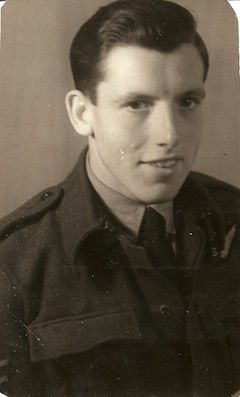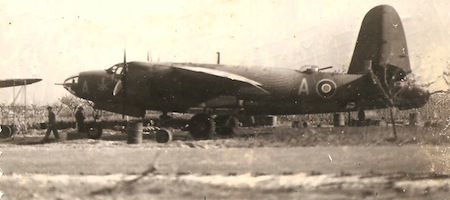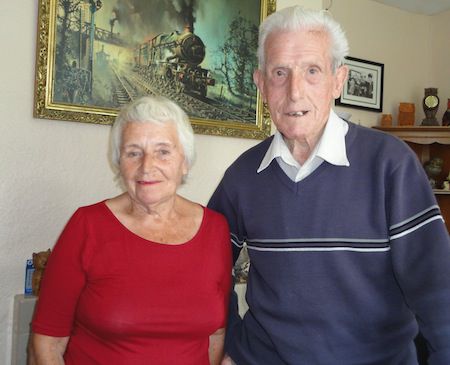Bill Thomas
15th January 2016

Bill Thomas in uniform with his signaller’s emblem. (Courtesy of Bill Thomas)
WW2 memories relevant to the war in the air have recently been rightly focused on The Battle of Britain, but there were other theatres. Here’s a remarkable tale that I want to tell you.
Bill Thomas was born near Clarbeston Road in 1924. He left school at fourteen to work in an office at James Williams of Narberth. At the age of seventeen he joined the Air Training Corps and then the RAF at eighteen.
In April 1943 Bill was called up to the Aircrew Receiving Centre at St John’s Wood, London and from there was posted to No. 19 Initial Training Wing at Bridgenorth in Shropshire for six weeks of ‘square bashing’. There followed a six month wireless operator’s course in Wiltshire, during which Bill reached 25 words per minute in Morse, before passing out in January 1944 with a signallers brevet and the rank of sergeant.
In May 1944 Bill sailed to Egypt for a six week Air Gunner’s course and then became operational with 70 Operational Training Unit. In mid August, still in Egypt, Bill’s crew were engaged in formation flying practice. Emerging from cloud, Bill’s Marauder bomber collided with the Leader’s aircraft, ‘Our huge propellers chopped off his tail fin and rudder, sending them spinning down,’ Bill told me.

Marauder B26; a difficult aircraft to fly, nicknamed ‘The widow maker’. (Courtesy of Bill Thomas)
The six South African Crew, all war veterans, were killed. An RAF Flying Officer who had gone up, ‘for the ride’, escaped through the astro hatch and parachuted to safety, but suffered multiple injuries as a result of a hard landing. Despite being unsurprisingly, extremely shaken and having badly damaged propellers, Bill’s pilot made a good landing.
Bill’s crew were posted to Italy in October 1944 and became part of the 25 Squadron South African Air Force at Campo Marino alongside the Adriatic. (The SAAF were short of wireless operators and Bill, along with 23 others had been seconded to them). There followed 43 bombing sorties over former Yugoslavia acting in support of the partisans.
‘On one occasion,’ reveals Bill, ‘‘when heavy flak was bursting very close to the formation, with a heavy smell of cordite, the skipper’s words came over the intercom, ‘these b......ds have got their first team out today.’’ On return to base, it was found that the port navigation lights had been shot away. Absolute disaster was never far away.
On the 1st April 1945, the formation that Bill was with was nearing the Yugoslav coast when one of the pilots advised that an engine was overheating. The aircraft was instructed to turn back and Bill’s plane was ordered to act as escort, ‘As we turned around, we could see the crew already abandoning the damaged plane and parachuting into the Adriatic.’
Bill’s aircraft circled the men in the water for one and half hours during which Bill had to send out countless SOS messages directing a Catalina flying boat to the scene. As the Catalina arrived, so Bill’s aircraft left, running low on fuel. Bill was praised for faultless, accurate wireless usage and was excused debriefing.
Four days before the end of the war, Bill’s crew were on their 43rd and final mission. The target was a vital bridge near Jasenovac which the Germans were pouring troops over. They were told to expect little flak but, ‘as we approached the target, so all hell broke loose. We were caught in a heavy barrage of anti-aircraft fire.’
The aircraft on Bill’s left took a direct hit, flipped over and plunged to the ground. All six crew were killed together with a South African Warrant Officer who had again, ‘gone along for the ride’, not wanting to end the war without having been in action. This time, the extra passenger wasn’t so lucky.
After VE day, Bill was posted to Naples where he acted as a pay account’s clerk with an RAF transport unit. He returned to the UK in 1947 and after being demobbed began working at Haverfordwest railway station. On the 31st August 1963 Bill married Shirley. They recently celebrated their 52nd anniversary.

Bill and his wife Shirley